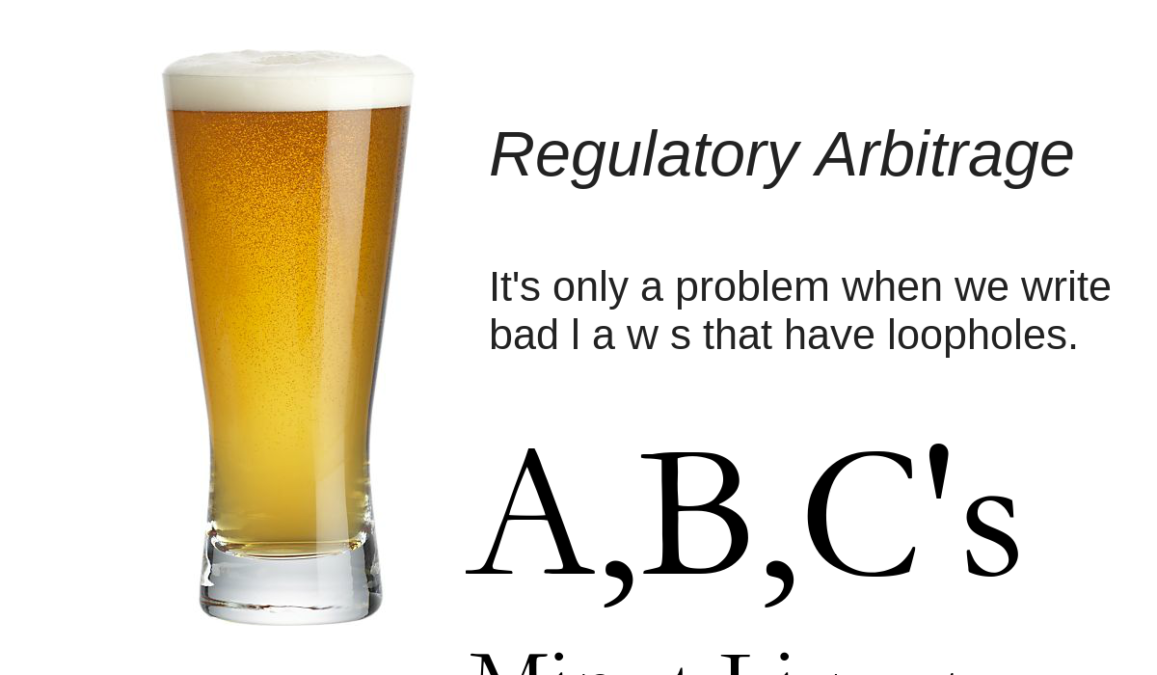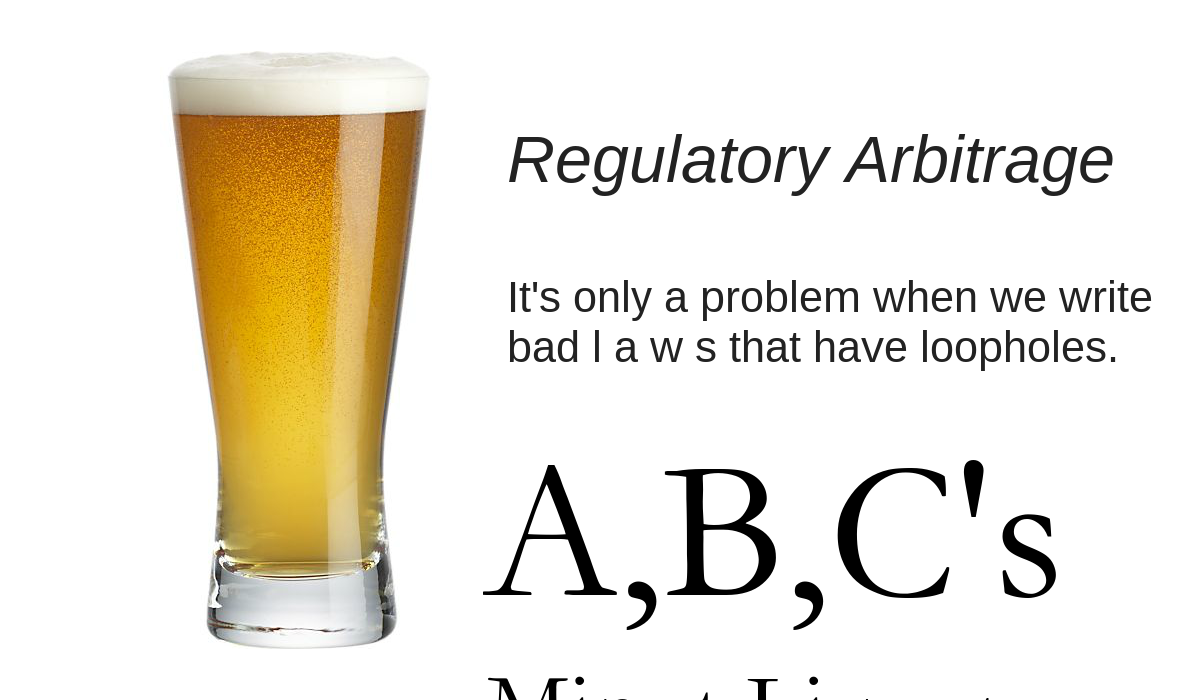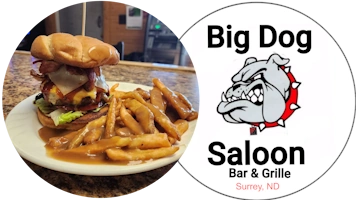In today’s economics lesson, I’ll talk a bit about regulatory arbitrage, and why Minot’s new liquor license law is such a terrible one. And it’s the perfect place to start because it’s the exact practice we as a City were trying to eliminate by writing a new law.
In a nutshell, regulatory arbitrage is the practice of exploiting loopholes in laws.
And if you want a bit more background on what this post is all about, here’s the introductory story on the Economic A, B, C’s. Here’s a link to our past liquor license coverage.
Background: The Retail Liquor License and the Supper Club License
- Retail liquor license: Costs an unknown amount of money (expensive) to purchase an existing license plus $3,125 per year. Allows you to sell beer, wine, and liquor on or off-sale. In essence, this is the license you need to run a bar.
- Supper Club License: Previously, a supper club license required $3,125 annual fee and allowed a business that ‘primarily operates as a restaurant’ to sell beer, liquor, and wine.
The Regulatory Arbitrage: It was brought to the attention of City officials that a relatively new establishment with a supper club license wasn’t operating within the spirit of the law by operating primarily as a restaurant. The feeling from some was that this new establishment was operating primarily as a bar, but with a supper club license — thereby skirting the requirement to purchase an expensive and limited ‘retail liquor license’.
The Goal: The reason for undertaking this whole process (changing the liquor license law) was to eliminate the run-a-bar-with-a-supper-club-license loophole by more clearly defining what it means to be a supper club.
The Result: We got a law that attempts to more clearly define what a supper club is and how it can operate. Here’s the key language from our new law.
Section 5-16-6-c
i. A supper club licensee shall derive, on an annual basis, more income from sale of food consumed on its business premises than it does from the sale of alcoholic beverages consumed on it’s premises;
vi. A supper club licensee shall dicontinue the sale and consumption of alcoholic beverages on the licensed premises within one (1) hour of the time the full kitchen is not in operation. During all other hours of the supper club, the full kitchen shall remain in operation for continuous food service;
So to summarize, supper clubs need to sell more food than alcohol, and they can only sell alcohol for an hour after closing their ‘full kitchen’.
Did We Close the Loophole?
If we’re to judge the new law as a good one, we have to ask, did we close the loophole? Does the law effectively regulate the offending behavior it was intended to prevent?
And what about the gaming clause? An amendment from City Council makes operating gaming tables legal in supper clubs. Doesn’t that serve to further muddy the water between what is a bar and what is as supper club?
Is the ‘Full Kitchen’ Clause Just Another Loophole
Have you ever been to a restaurant that doesn’t serve every item on their menu at every hour of the day? The answer is yes. Will a supper club license holder attempt to exploit this loophole? I have no idea. And if they do, would the City attempt to defend it by removing a license? I have no idea. What I do believe is this: a supper club licensee would have a strong legal argument for defining their ‘full kitchen’ in any way they see fit.
You see what I’m getting at here right? Even though we attempted to close the loophole, it seems like we may have opened another one and exposed ourselves to costly legal battle as well.

The Unintended Consequences…
If you look closer at full kitchen provision, you’ll quickly see that it incentivizes low-cost kitchen operations. How do you operate a bar without a full retail liquor license? Open a restaurant and serve fast and easy frozen food. Your kitchen costs will be minimal so can keep the bar open late and let the alcohol sales more than cover the costs.
However, for restaurants that run a unique food operation and want to follow the spirit of the law — as it is now written — life just got harder. They’ll now have to keep a chef paid, and the grills fired until midnight so they can prepare food to their high standards — even if no one wants to eat that late. And they’ll have to do it all because they wanted to let a few tables finish a bottle of wine or have a final drink.
What do You Think?
Does Minot’s new supper club definition close the loophole and stop the original regulatory arbitrage? Does it more clearly differentiate between what is a bar and what is a supper club? And does it create unintended regulatory costs for restaurants that were already operating within the spirit of the law?
Let us know in the comments below!





While I understand your frustration the wording of this article is leaning towards sympathy and not reality. If a customer wants to finish their last drink or bottle of wine after their meal that would give the supper club at least an hour to shut everything down. This is more than a reasonable time period. Chain restaurants in Minot and other areas have been doing this for years with no problems and haven’t shut their doors.
You can’t claim to be a place serving unique food options as your reasoning and in the same breath say you no longer want to serve food. From an outsider it appears this is just a few establishments trying to have the best of both worlds without the expenses associated.
If this is a real issue concerning many and not just a few it will be easy for the Minot Voice and others to gather signatures and put it to public vote to change the laws altogether. (not sure on the exact procedures, but ND seams to have a very allowable process for the average citizen or group to do make this happen)
Hey Tim,
You’re right, there is some ambiguity in the article. Here’s the point I was most trying to get across. The process City Council went through was an attempt at eliminating regulatory arbitrage. And after three months and a new law, we failed. We didn’t close the loopholes, we just moved them around and possibly opened ourselves to a legal challenge of the law if we try to enforce it.
So we didn’t do what we set out to do… fix the law, but we did succeed at adding regulatory costs to businesses that were already operating within the spirit of the law, i.e., businesses that were clearly operating as restaurants. The end result — regulatory failure: when regulatory costs outweigh economic costs.
Thanks for reading!